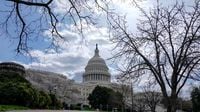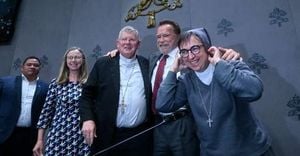In a week that laid bare the complexities and contradictions of American politics, Kentucky found itself at the center of two national controversies: a government shutdown that threatens the livelihoods of thousands, and a heated debate over free speech that saw Republican lawmakers challenge their own party’s leadership. The events, unfolding in the last days of September 2025, have sparked fierce arguments over constitutional rights, political responsibility, and the ever-present tension between government power and individual liberty.
On October 1, 2025, the federal government officially shut its doors at 12:01 a.m., after Senate Democrats rejected a Republican-backed measure to keep funding the government. As reported by the Associated Press, this marks the first government shutdown in nearly seven years. The immediate fallout was felt across Kentucky, where federal employees braced for furloughs and programs dependent on federal grants faced uncertain delays. The shutdown, a dramatic climax to weeks of political brinkmanship, has left both parties blaming each other for the impasse.
Kentucky’s own U.S. Rep. Thomas Massie, a Republican, voiced frustration with the process, telling the press that he had voted against government shutdowns during both President Biden’s and President Trump’s administrations. His stance, nuanced and somewhat rare in the current climate, highlighted the rift within the Republican Party itself. Massie’s remarks came as Kentucky Democratic Party Chair Colmon Elridge blasted the GOP for what he described as reckless disregard for working families.
“Republicans chose to shut down the government because they do not care if your family can afford to see a doctor,” Elridge said, referencing the recent passage of Trump’s federal budget, which included cuts to health care that are projected to remove 200,000 Kentuckians from Medicaid. “They spent weeks refusing to work with Democrats to prevent a triple-digit spike in health insurance premiums. The GOP would rather shut down the country than address the health care crisis they created.”
Rep. Morgan McGarvey, another Kentucky Democrat, echoed these concerns as Congress neared the shutdown deadline. “Republicans control the White House, the House, and the Senate, and they’re making it clear they would rather shut the entire government down than pass a budget that actually gives families a fair shake,” McGarvey said on October 1. “I’m here in Washington to pass a budget that addresses rising costs like health insurance, but House Republicans are nowhere to be found. They need to get back to Washington to work with us on lowering costs and opening the government back up.”
While the shutdown’s immediate impact is economic—federal employees in Kentucky facing lost paychecks, and essential services at risk—the political fallout is equally significant. The Senate is expected to vote again, but with both sides dug in, the path to a resolution remains murky. For many Kentuckians, the impasse is a stark reminder of the high stakes and human costs of political gridlock.
Yet, even as Congress was careening toward shutdown, another drama was playing out on the national stage—one that would see Kentucky Republicans take an unexpected stand for free speech, even as they faced pressure from their own party’s leadership. The controversy began with late-night host Jimmy Kimmel’s remarks about the assassination of conservative activist Charlie Kirk. On the day of the murder, Kimmel condemned the act and offered condolences to Kirk’s family, but also commented on his show, “The MAGA gang [is] desperately trying to characterize this kid who murdered Charlie Kirk as anything other than one of them, and doing everything they can to score political points from it.”
Kimmel’s assertion—that the killer was motivated by MAGA ideology—rested on early evidence that soon proved incorrect. This misstep opened the door for Federal Communications Commission Chair Brendan Carr to intervene. According to The State Journal, Carr accused Kimmel of “playing into that narrative that this was somehow a MAGA or Republican-motivated person,” and warned, “We can do this the easy way or the hard way. These companies can find ways to change conduct and take action, frankly, on Kimmel, or, you know, there’s gonna be additional work for the FCC ahead. … The FCC is gonna have remedies that we could look at.”
Carr’s comments, which many interpreted as a threat, quickly led Nexstar Media Group—owner of more than 20 ABC affiliates—to suspend Kimmel’s show. Carr celebrated the decision, declaring, “We’re not done yet.” But the backlash was swift, especially from Kentucky’s Republican delegation. Rep. Brett Guthrie, who chairs the House committee overseeing the FCC, stated on September 18, “We have to be extremely cautious to not try to use government to influence what people say.” His words carried weight, and within days, other Kentucky Republicans joined the chorus of dissent.
Sen. Rand Paul, speaking on “Meet the Press,” was unequivocal: “Brendan Carr’s got no business weighing on this. … I’ll fight any attempt to get the government involved with speech.” Rep. Thomas Massie, who has at times found himself at odds with former President Trump, called Carr’s remarks “antithetical to the First Amendment.” The strongest rebuke, however, came from Texas Sen. Ted Cruz, who likened Carr’s “easy way or the hard way” line to a threat from the mobster movie “Goodfellas,” calling it “dangerous as hell.”
Senate Minority Leader Mitch McConnell, a seasoned political operator known for his careful words, weighed in after being contacted by The State Journal. “As a First Amendment guy, I think he’s probably got it right,” McConnell said of the objections to Carr’s approach. “You don’t have to like what somebody says on TV to agree that the government shouldn’t be getting involved here.” Rep. James Comer added, “The federal government must never interfere with Americans’ constitutional right to free speech.”
The pushback from Kentucky Republicans and their allies had an immediate effect. Carr retreated from his aggressive posture, and ABC reinstated Kimmel’s show. The episode, while rooted in a specific controversy, raised broader questions about the government’s role in regulating speech and the responsibilities of both media and public officials in a polarized era.
Some conservatives have drawn parallels between Carr’s actions and efforts by Biden administration officials to pressure social media companies to curb misinformation during the COVID-19 pandemic. Yet, as The State Journal pointed out, those earlier efforts did not involve the kind of explicit threats Carr made. The debate, then, is not just about free speech, but about the methods and tone of government intervention in public discourse.
As the dust settles, many Kentuckians are left reflecting on a turbulent week in which their representatives took center stage in two of the nation’s most contentious debates. Whether defending the First Amendment or grappling with the fallout of a government shutdown, Kentucky’s politicians have demonstrated that, even in a deeply divided country, moments of principle and pragmatism can still emerge—sometimes from the most unexpected quarters.




